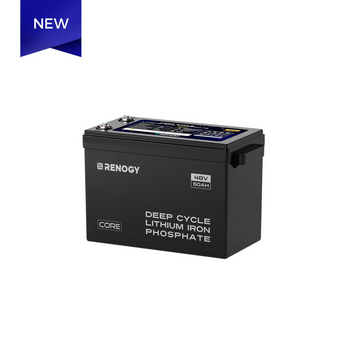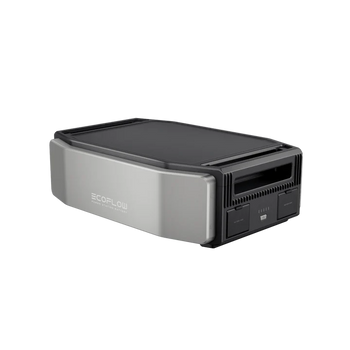Lithium Iron Phosphate Batteries
LiFePO4 (Lithium Iron Phosphate) Batteries
LiFePO4 (Lithium Iron Phosphate) batteries represent a modern and advanced technology, offering several benefits over traditional AGM batteries. These batteries are not only lighter and more efficient in storing and releasing energy, but they also boast a longer lifespan. Although they come with a slightly higher price tag compared to AGM batteries, their high cycle life and longevity make them a worthwhile long-term investment.
Key Advantages of Lithium Iron Phosphate Batteries:
- Deep Discharge: LiFePO4 batteries can be discharged down to under 20% charge without significant damage, provided they're recharged promptly. This is a stark contrast to traditional lead-acid batteries which can't handle such deep discharges.
- Long Storage Durability: They can be left unattended for extended periods at a partial State Of Charge (SOC) between 50-80%. Unlike lead-acid batteries that might degrade under similar conditions, LiFePO4 batteries remain intact.
- Expandability: New LiFePO4 batteries can be added to older ones if they belong to the same approved categories, typically from the same manufacturer. This flexibility is unmatched by traditional lead-acid batteries.
- Minimal Cabling Worries: Unlike lead-acid batteries, LiFePO4 batteries don't require meticulous attention to cabling lengths, thanks to reduced concerns related to the Peukert Effect.
- Advanced Technology: Most LiFePO4 batteries nowadays come with onboard computers or internal BMS (Battery Management System) to monitor and manage various battery parameters, including temperature-controlled charging.
-


Rich Solar
$1,099.00RICH SOLAR 12V 200Ah(ALPHA 2 PRO) lithium iron phosphate battery has a much longer cycle life capacity, and is easier to maintain compared to other battery technologies. Features Specifications Manufacturer: Rich SolarProduct...$1,099.00 -


Rich Solar
$599.99RICH SOLAR 12V 100Ah(ALPHA1 PRO) group 24 lithium iron phosphate battery has a much longer cycle life capacity, and is easier to maintain compared to other battery technologies...$599.99 -

Discover
$1,950.00AES RACKMOUNT 48-48-5120-H AES RACKMOUNT is the rapid install energy storage system designed for Residential Off-Grid Solar and Whole-Home Backup Power. The battery features a high-current GEN-4 BMS that delivers superior peak power for demanding...$1,950.00 -

Discover
$1,900.00AES RACKMOUNT 48-48-5120 AES RACKMOUNT is the rapid install energy storage system designed for Residential Off-Grid Solar and Whole-Home Backup Power. The battery features a high-current GEN-4 BMS that delivers superior peak power for demanding load...$1,900.00 -


Battle Born
$925.00The powerful battery solution to elevate any outdoor adventure. It’s time to upgrade from your traditional lead acid battery! What you need is a new battery that’s lighter, safer, and works with various systems. More importantly, it...$925.00 -

Discover
MSRP: $9,206.45$4,999.00Discover, 6.65kWh, 51.2VDC AES Lithium Ion Battery, Xanbus, 42-48-6650 Discover Advanced Energy (AES) batteries allow for equipment design and functionality improvements and deliver productivity gains through enhanced cycling, charge time and weight...MSRP: $9,206.45$4,999.00 -

Discover
MSRP: $8,861.75$7,018.50Discover, 6.65kWh,51.2VDC AES Lithium Ion Battery, Canbus, 12-48-6650 Discover Advanced Energy (AES) batteries allow for equipment design and functionality improvements and deliver productivity gains through enhanced cycling, charge time and weight...MSRP: $8,861.75$7,018.50 -

Discover
MSRP: $4,270.85$3,382.50Discover, 2.80kWh, 5.6VDC AES Lithium Ion Battery, Canbus, 14-24-2800 Discover Advanced Energy (AES) batteries allow for equipment design and functionality improvements and deliver productivity gains through enhanced cycling, charge time and weight...MSRP: $4,270.85$3,382.50 -

Discover
MSRP: $4,615.55$2,999.00Discover, 2.80kWh, 25.60VDC AES Lithium Ion Battery, Xanbus, 44-24-2800 Discover Advanced Energy (AES) batteries allow for equipment design and functionality improvements and deliver productivity gains through enhanced cycling, charge time and...MSRP: $4,615.55$2,999.00 -


Renogy
$949.99 - $6,799.99Impressive 6000 Cycle Life. Automatically heats up for safer charging below 32°F. Expandable capacity for 19.2kWh of backup power(8P). IP65 water and dust resistant. BMS protections guarantee the safety and stability of your battery...$949.99 - $6,799.99 -


Ecoflow
MSRP: $799.00$699.00*Note: The terms "DELTA" and "RIVER" as mentioned on this page refer to products exclusively manufactured by ECOFLOW INC. Features · Expandable capacity - Increase the capacity of DELTA 2 with an extra 1024Wh...MSRP: $799.00$699.00 -


Ecoflow
$3,299.00EcoFlow DELTA Pro Ultra is a residential power backup system designed for both extended outages and daily use. With an unrivaled capacity of 6kWh, 7.2kW output,and 5.6kW solar input, a single unit can run your entire home. With EcoFlow Smart Home...$3,299.00
Frequently Asked Questions About Lithium Iron Phosphate Batteries
A1: A lithium iron phosphate (LiFePO4) battery is a type of rechargeable battery that is made up of lithium iron phosphate cells. It is commonly used in various applications, including solar systems, electric vehicles, and backup power systems. 12 volt, 24 volt and 48 volt models are available. All lithium batteries must have a Battery Management System (BMS) of some kind. There are two types of BMS, external and internal. All the SolarTown lithium models sold on our website have an internal BMS that is built into the battery.
A2: The advantages of using a lithium iron phosphate battery include high energy density, long cycle life, low self-discharge rate, fast charging capability, long term expandability, and excellent thermal stability. It is also safer and more environmentally friendly than other types of lithium-ion batteries.
A3: The lifespan of a lithium iron phosphate battery depends on several factors, including the quality of the battery, the number of charge and discharge cycles, and the operating conditions. Generally, a high-quality LiFePO4 battery can last up to 10 years or more with proper care and maintenance.
A4: To maximize the lifespan of a LiFePO4 battery, it should be stored in a cool and dry place. Install or store away from direct sunlight, moisture, extreme cold, and heat sources. All loads should be disconnected. It should also be stored at a partial state of charge, ideally around 50% to 60% of its maximum capacity. Check with the battery manufacturer for specific recommendations.
A5: Yes, a LiFePO4 battery can be overcharged, which can cause damage to the battery and reduce its lifespan. It is recommended to use a BMS that can prevent overcharging and ensure the battery is charged within its safe operating limits.
A6: A LiFePO4 battery can be charged using a compatible charger that is designed for LiFePO4 batteries. It is important to follow the manufacturer's recommendations for charging, including the charging voltage and current, to avoid damaging the battery.
A7: The depth of discharge (DOD) for a standard LiFePO4 battery can vary depending on the specific model and manufacturer of the battery, but typically a DOD of 80% is considered safe and acceptable for this type of battery. This means that the battery should not be discharged below 20% of its rated capacity.
It's worth noting that deep discharging a LiFePO4 battery beyond its safe DOD can cause damage to the battery and reduce its overall lifespan. To ensure the longest lifespan of your LiFePO4 battery, it is recommended to avoid deep discharging as much as possible and recharge the battery before it reaches its safe DOD. If it does become fully discharged, the BMS will shut the battery down to prevent damage. In these extreme cases, the battery must be recharged via an external source like a DC charger, standard solar charge controllers or inverter/chargers will not work. Be sure to recharge a dead battery within 72 hours as best practice.
A8: Yes, a LiFePO4 battery can operate in extreme temperatures, both hot and cold. However, extreme temperatures can affect the battery's performance and lifespan, so it is important to monitor the battery and take appropriate precautions, such as using a battery enclosure or insulation. Lithium batteries should not be charged at temperatures below freezing, although they can be discharged. All the models we sell have BMS systems that prevent charging when temperatures are below freezing. Some batteries have self-heating options to mitigate this issue.
A9: Yes, a LiFePO4 battery is considered safe and stable, with a lower risk of thermal runaway and fire compared to other types of lithium-ion batteries. However, like any battery, it can be dangerous if mishandled or damaged, so it is important to follow proper handling and safety procedures.
A10: Unlike traditional lead-acid batteries, you can add new LiFePO4 batteries to old ones. As long as you are adding the same brand and model of battery, this can generally be done, within manufacturer specifications. Typically there are limits to the total number of series or parallel connections that can be made. Some manufacturers allow batteries of different sizes to be used together in a bank, but always confirm this with the manufacturer.
A11: Yes, there are. Per United States Department of Transportation and United Nations regulations, LiFePO4 Batteries are classified as Class 9 dangerous goods and come under UN3480 shipping and handling rules. As a result there are special shipping requirements and costs associated with these products. All shipments must comply with 49 CFR and IATA Regulations. Dangerous goods ground shipments are limited to 70 pounds per package. Batteries in excess of 70 pounds must ship by LTL Freight. There are no guaranteed delivery times for dangerous goods shipments. Your order may be held up by the carrier for any reason.
We only ship to the 48 contiguous States. Shipments to Alaska, Hawaii or other US territory must be by Air Cargo or by using a freight forwarding service. These services are at additional costs to the buyer. We are restricted from shipping batteries through USPS which excludes delivery to any APO and FPO or any post office box address. Battery shipments may not be sent to any mail forwarding companies, such as The UPS Store, unless they are certified to handle dangerous goods shipments. The customer is required to unload the battery or pallet from the truck. We recommend that you have a loading dock or forklift available. Any additional fees charged by the carrier, such as residential delivery, lift-gate delivery, inside delivery etc., that are not specified or requested when ordering will be the responsibility of the receiving customer. Please notify us when ordering if a lift gate or other service is required.
We do not offer expedited shipping service. All international shipments must be shipped in Air Cargo Only aircraft and may have country or area restrictions. Please contact us for a quote.
Credit card processors will no longer refund the process fee. If you cancel an order after payment has been processed, the 2.9% fee will be deducted from your refund. If you cancel after the order has been shipped, all shipping related costs will be deducted from your refund.
